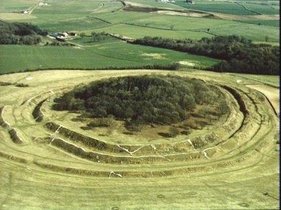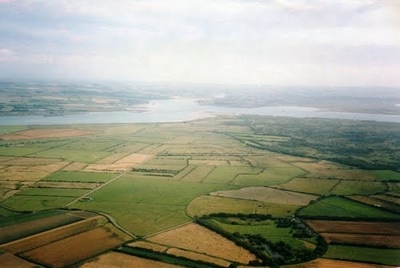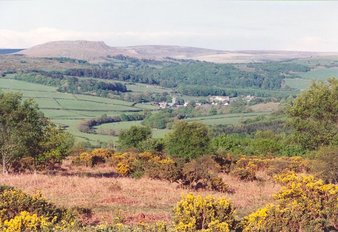6th to 9th Century Meavy
How many years my ancestors lived on the exact piece of land that is now Meavy is something that will never be determined, but I think that I can say, and with some certainty, that they were of the tribe of British people who came to be known as the Celts, a group of people who it seems did not physically invade like the Vikings and and Angles but arrived in dribs and drabs and whose influence's of art and culture, shaped this western part of England. I can only assume that my ancestors were always at Meavy, but equally they could have wandered in and settled there from some other area of Devon. It is not too hard to visualise the early settlement in which the Meavy family lived as a quiet and desolate area that was protected by a river on both its sides.
At the very beginning of the 6th century, the Saxon invaders push westward was halted at Badon Hill in Wiltshire and according to the 9th century Historia Brittonum, it was a victory by the Britons with King Arthur at their helm, a victory that held the Saxons at bay for over seventy years.
At the very beginning of the 6th century, the Saxon invaders push westward was halted at Badon Hill in Wiltshire and according to the 9th century Historia Brittonum, it was a victory by the Britons with King Arthur at their helm, a victory that held the Saxons at bay for over seventy years.
Duodecimum fuit bellum in monte Badonis, in quo corruerunt in uno die nongenti sexaginta viri de uno impetu Arthur; et nemo prostravit eos nisi ipse solus.
"The twelfth battle was on Mount Badon in which there fell in one day 960 men from one charge by Arthur; and no one struck them down except Arthur himself"
"The twelfth battle was on Mount Badon in which there fell in one day 960 men from one charge by Arthur; and no one struck them down except Arthur himself"
The Battle Dyrham in Gloucestershire in 577 severed the tie between the Britons of Wales and their sister tribes of Devon with the effect of allying the county with Cornwall.
When the Saxon’s finally arrived the lives of the West Country people were turned upside down, no longer could they live their ‘clan’ existence but they had to conform to a new way of living, to the system of cultivation in the open field, areas split into our equivalent of allotments being one of them. In the year, 614 the Saxon's first attack met the people of Devon at Bindon, near Axemouth. Slinging stone have been found at the hill fort of Hawkesdown, this suggests that the Britons had the advantage. Despite this, the people of Devon were defeated enabling their enemy to take over the land of the Axe and Coly Valleys. In 682, the Saxon king Centwine made another attack to the north of Dartmoor, the Anglo Saxon Chronicle tells us that "Centwine drove the Britons to the sea". This, it seems, was the end of the Britons in Devon, nearly all of the lands of these ancient people passed into Saxon hands, and the kingdom of Dumnonia shank to what is now the County of Cornwall.
My Meavy ancestors were a conquered people, and we can only wonder how many of them stayed, living their lives in their isolated farmsteads until they too had to accept this new feudal system or move to the new towns, such as Plymton and Tavistock that were appearing nearby.
When the Saxon’s finally arrived the lives of the West Country people were turned upside down, no longer could they live their ‘clan’ existence but they had to conform to a new way of living, to the system of cultivation in the open field, areas split into our equivalent of allotments being one of them. In the year, 614 the Saxon's first attack met the people of Devon at Bindon, near Axemouth. Slinging stone have been found at the hill fort of Hawkesdown, this suggests that the Britons had the advantage. Despite this, the people of Devon were defeated enabling their enemy to take over the land of the Axe and Coly Valleys. In 682, the Saxon king Centwine made another attack to the north of Dartmoor, the Anglo Saxon Chronicle tells us that "Centwine drove the Britons to the sea". This, it seems, was the end of the Britons in Devon, nearly all of the lands of these ancient people passed into Saxon hands, and the kingdom of Dumnonia shank to what is now the County of Cornwall.
My Meavy ancestors were a conquered people, and we can only wonder how many of them stayed, living their lives in their isolated farmsteads until they too had to accept this new feudal system or move to the new towns, such as Plymton and Tavistock that were appearing nearby.
The Meavy family that did stay would have found everything they needed in their surrounding area, all the natural resources they needed to survive. Even with the river, from whom they took their name, protecting them on both sides, their village would still need protecting from wild boar, wolves and foxes. High fences would be built to keep their livestock in as much as it was to keep out any wild animals. By the beginning of the 8th century, wild animals were not the only threat to small
villages, the biggest threat was that of the marauding Norsemen arriving on England's shores. The Vikings were a fearless group of warriors, sailing the oceans in their magnificent dragon ships, and it has been said that without these great ships the Viking Age would never have happened. Many villages up and down the length and breadth of England were ravaged, but history tells us some of the Viking people integrated themselves into the British way of life. Those who returned to their own lands left behind their language and place names, names that still remain with us in the north of England such as Nottingham, Derby, and York. I wonder if there are any people, in Devon and Cornwall, that have no Saxon and Viking DNA?
Adam Rutherford in his book, A Brief History of Everyone Whoever Lived wrote:
villages, the biggest threat was that of the marauding Norsemen arriving on England's shores. The Vikings were a fearless group of warriors, sailing the oceans in their magnificent dragon ships, and it has been said that without these great ships the Viking Age would never have happened. Many villages up and down the length and breadth of England were ravaged, but history tells us some of the Viking people integrated themselves into the British way of life. Those who returned to their own lands left behind their language and place names, names that still remain with us in the north of England such as Nottingham, Derby, and York. I wonder if there are any people, in Devon and Cornwall, that have no Saxon and Viking DNA?
Adam Rutherford in his book, A Brief History of Everyone Whoever Lived wrote:
"There is virtually no trace of the Danes in the British genome. Compared with the Angles and Saxons and even the Norwegians' genetic legacy in the north of Scotland, there is an absence of Danish DNA, despite their long adventure here. That says something of their 200 year rule, they didn't integrate.
Interestingly though, a recent study found that:
- There was no single 'Celtic' genetic group. In fact the Celtic parts of the UK (Scotland, Northern Ireland, Wales and Cornwall) are among the most different from each other genetically. For example, the Cornish are much more similar genetically to other English groups than they are to the Welsh or the Scots.
- There are separate genetic groups in Cornwall and Devon, with a division almost exactly along the modern county boundary.
The Vikings had originally conquered Normandy, so when the Normans arrived in 1066 you could argue that the Vikings invaded us twice!
By the time of Edward the Confessor, the lands of Meavy were held by four Saxon lords, Alward, Alwin, Edward and Oswulf, it is at this time that we meet the first of my Meavy ancestors who can be named.




